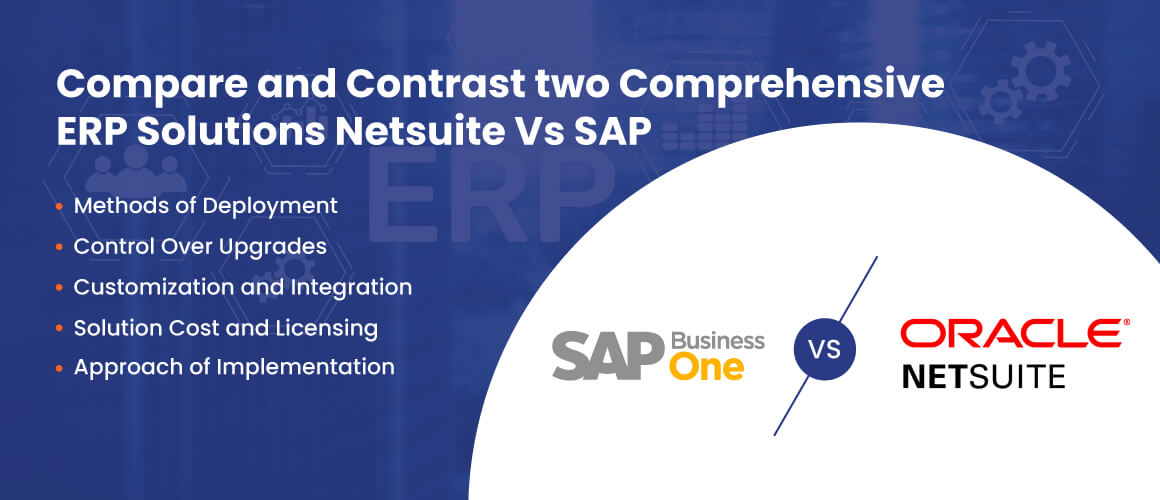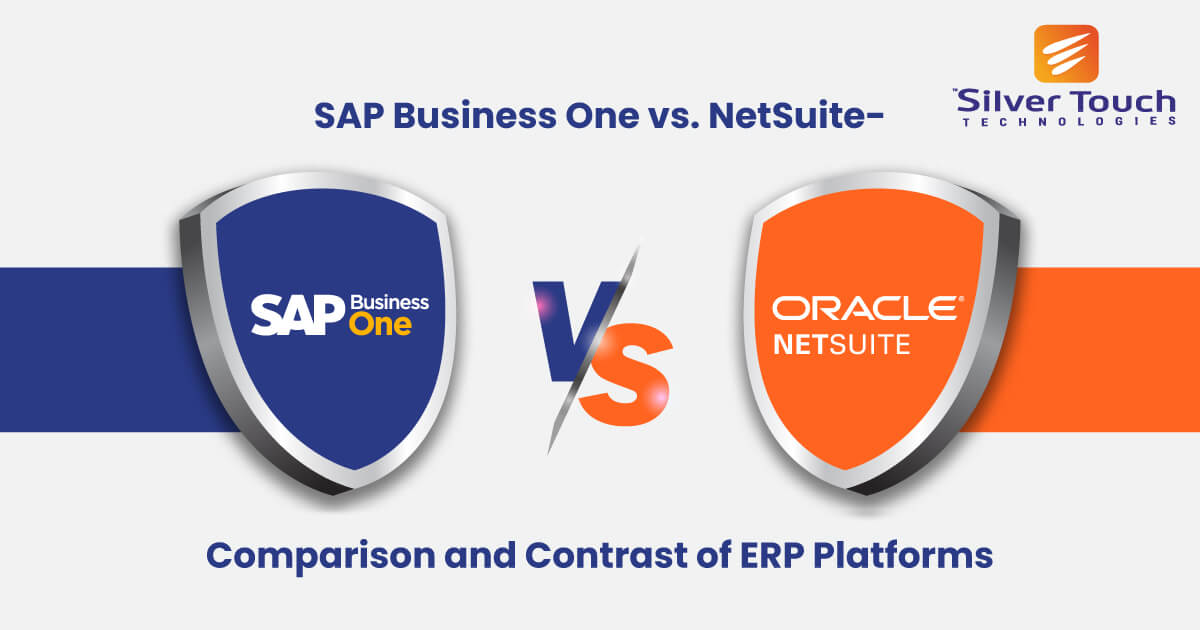In the highly competitive scenario and vast landscape of Small-Medium Businesses (SMBs) and Mid-Market Enterprises (MMEs), choosing the ideal ERP solution can be an intricate task. In this post, we will compare two popular ERP platforms- SAP Business One vs. NetSuite. This comparison will help you make the right decision for your company.
Both these "all-in-one" ERP solutions cater to various industry sectors with comprehensive functionalities and enterprise-level features. Startups and SMBs that focus on achieving rapid growth consider SAP Business One and Oracle NetSuite as their go-to choices.
Let's understand the key points of comparison between SAP Business One vs Oracle NetSuite along with their introduction.
What is SAP Business One vs. NetSuite?
Over one million users and more than 60,000 corporate customers use a robust ERP solution for SMEs, SAP Business One. Its fully integrated functionality over different departments like operations, CRM, inventory, and financials make it a preferred platform for SMEs worldwide.
Oracle NetSuite is a single, fully-integrated ERP system that helps companies manage their key business processes. It also helps companies manage systems related to inventory, customer relationship management, and financials.
When we compare NetSuite vs. SAP, some clear advantages of SAP Business One are clearly visible. But before discussing these aspects, let’s understand the concept of ERP and its importance for modern businesses.
What is ERP and why is it important in businesses?
Many entrepreneurs are either unaware of the benefits or prefer to sit on the fence due to misconceptions about ERP software. Therefore, it is necessary to understand the importance of selecting the best ERP solution for the company. We give an outline of ERP solutions before digging deep into the points of difference between SAP Business One vs. NetSuite.
ERP, short for Enterprise Resource Planning, is a robust and reliable software that streamlines and integrates various applications to enhance the efficiency of business operations. It encompasses a range of essential functions that span across different areas of your organization. These functions are planning and budgeting, business intelligence, financial management, operations management, human resource management, supply chain management, CRM, inventory management,and marketing automation.
An ERP solution aims to support crucial processes like order-to-cash and procure-to-pay, ensuring smooth workflows and optimal performance. However, fair to mention that not all ERP systems offer every single function. It is possible that some of these systems specialize in specific areas while lacking in others. In such cases, custom add-ons might be necessary to meet your unique requirements.
Let's compare and contrast two comprehensive ERP solutions NetSuite vs SAP.
Compare and contrast the features of SAP Business One and NetSuite

When it comes to discussing SAP Business One vs Oracle NetSuite, we can compare this popular ERP software from five major aspects.
-
Methods of Deployment
This is the number one difference you’ll hear about in comparisons of SAP Business One vs. NetSuite.
NetSuite is a public cloud ERP solution with over 33,000 customers. It has a multi-tenant cloud platform that offers easy access to your ERP system through a web browser. Here, your data is available to you with a monthly base platform fee. Additionally you need to pay a fee for each user. You’ll automatically have access to the latest version of the software and Oracle handles all system back-ups and data security measures.
SAP Business One, on the other hand, is traditionally recognized as an on-premise ERP solution, where you house the system on your own servers in your building. You can also go with a private cloud solution, where a third-party company hosts an ERP system in their data center. It enables your users to access the system through the internet. This eliminates the infrastructure costs the same way a public cloud solution would, but here SAP B1 is a game-changer. It offers you the same level of control over your data that you would have with an on-premise system. In a way, SAP Business One offers you a blend of public cloud and on-premise, giving you the best of both worlds.
-
Control Over Upgrades
SAP Business One and NetSuite offer different approaches for control over upgrades.
NetSuite, being a public cloud solution, automatically applies new versions, ensuring that you're always running the latest version with the latest features. However, it is important to note that customers get upgrades according to a predetermined schedule, with limited flexibility in the maintenance window. It makes it essential to plan for testing before the new version goes live, even if it coincides with a busy period for your business. You need to establish close collaboration with your NetSuite implementation partner to address this concern.
On the other hand, SAP Business One offers more control over upgrade timing, whether you choose an on-premise or private cloud deployment. This means you can coordinate upgrades of your ERP system along with any customizations or integrations to minimize disruption to your daily operations. However, it is important to consider that opting out of upgrades and sticking to older versions may limit your access to new functionality.
-
Customization and Integration
Customization options and integration capabilities play a vital role in selecting the right ERP solution. Both SAP Business One and NetSuite have relatively straightforward processes for SMEs.
NetSuite revolves around a suite of modules that can be easily augmented to provide advanced functionality. Users can leverage point-and-click app customization to configure processes, user interfaces, and reports. The SuiteApp ecosystem offers a range of integrated solutions to extend the system's capabilities. Additionally, NetSuite partners can provide customization through scripts or custom extensions and integrate with external applications using the SuiteCloud Platform.
Similarly, SAP Business One provides an ecosystem of certified add-on solutions to address industry-specific needs. Tools like Boyum B1 Usability Package or the Software Developer Kit (SDK) empower users to customize the functionality of SAP Business One. This flexibility extends to the ability to extend the ERP solution itself or seamlessly integrate with best-of-breed applications. You can consult an official SAP Partner for leveraging this benefit.
-
Solution Cost and Licensing
Talking about licensing models, both SAP B1 and NetSuite follow different ones. Let’s understand how we can calculate the cost of both these software.
NetSuite operates on a Software as a Service (SaaS) model, offering a monthly subscription fee structure. The cost of your NetSuite system is determined by factors such as the size of your company, the specific modules, the number of users, and the subscription duration. Many companies find this appealing as it provides a predictable and manageable operational expense rather than a significant capital expense. Additionally, the scalability of NetSuite enables users to easily adjust the number of users based on your evolving needs.
On the other hand, SAP Business One follows a perpetual licensing model, granting you ownership of the licenses indefinitely. With this approach, you make an upfront investment in purchasing the licenses, and thereafter, you pay an annual maintenance fee for each user. This maintenance fee covers access to system upgrades, bug fixes, and ongoing support. While the initial cost may be higher, the advantage lies in the long-term ownership of the licenses, ensuring that you have access to the system as long as you continue using it.
-
Approach of Implementation
When it comes to implementing ERP solutions, both SAP B1 and NetSuite offer distinct approaches that cater to different business requirements.
NetSuite provides the SuiteSuccess model, which offers a fixed-price implementation. This option is ideal for companies with straightforward, standardized processes. However, if your business demands extensive customization or integration, NetSuite accommodates such complex needs. It allows a flexible approach that adapts to your specific requirements.
SAP Business One follows a time and materials pricing model. This allows for greater customization and tailoring of the ERP solution to align precisely with your business needs. The advantage here lies in a more personalized implementation that addresses your unique challenges and goals more effectively.
Read more: SAP Business One Cost – Pricing Guide
Identify Target Audience for Each System
Startups and SMEs are ideal target audiences for both SAP B1 and NetSuite. But, SAP Business One has the slight upper hand in terms of functionality, flexibility, and user-friendliness over NetSuite. SAP Business One is a preferred choice for forward-looking companies and visionary entrepreneurs for various reasons.
Before finding the answer to the question of which one is better, SAP Business One vs. NetSuite, let’s have a glimpse of the pros and cons of both these platforms.
Pros and Cons of SAP B1 and NetSuite
This is an important consideration when we compare NetSuite vs. SAP Business One. Let’s go through the pros and cons of each platform.
|
Pros of SAP Business One
|
Cons of SAP Business One
|
| High Scalability and Robust Reporting |
Steeper Learning Curve |
| Better Integration Capabilities | Higher Upfront Costs |
| Powerful Functionality and More Customization Options |
Complex Implementation |
|
Pros of NetSuite |
Cons of NetSuite |
| High Scalability |
Monthly Subscription |
| Regular System Upgrades |
Limited Control and Steep Learning Curve |
| Robust Financial Management |
Integration Challenges |
| Cloud-based Solutions |
Dependency on Internet |
It’s time to conclude with finding the better option from NetSuite vs SAP Business One.

Which One is Better -SAP Business One or NetSuite?
SAP Business One has a comprehensive suite of tools and modules to meet requirements of various departments including finance, sales, inventory management, and manufacturing. It offers deep integration capabilities with other SAP products, allowing for seamless data exchange and process automation. SAP Business One also provides industry-specific solutions, making it suitable for businesses operating in different sectors. The system is highly scalable, allowing companies to expand their operations without outgrowing the software.
On the other hand, Oracle NetSuite offers a cloud-based ERP solution that integrates key business functions into a single platform. It provides dynamic features for financial management including revenue recognition. However, compared to SAP Business One, NetSuite may have limitations when it comes to meet complex manufacturing or distribution-related requirements.
In a nutshell, while both SAP Business One and Oracle NetSuite have their advantages for SMBs, SAP Business One stands out for its reputation, extensive functionality, and industry-specific solutions.
FAQs
Developed by the German company SAP SE, SAP Business One is a business management software useful for small and medium-sized enterprises.
Oracle’s NetSuite is a cloud-based business management platform useful for fast-growing organizations.
Both Oracle NetSuite and SAP Business One are considered “all-in-one” ERP solutions that support many industries. They are typically focused on fast-growth startups and MME-size companies globally.
Though SAP Business One and NetSuite provide excellent analytics and reporting capabilities, only SAP Business One offers in-memory database capabilities together with SAP HANA.
SAP Business One is a preferred choice for startups and SMBs.
SAP requires a one-time upfront cost and yearly subscription whereas NetSuite requires a monthly subscription cost. However, SAP Business One remains more cost-effective over the period with value for money.



